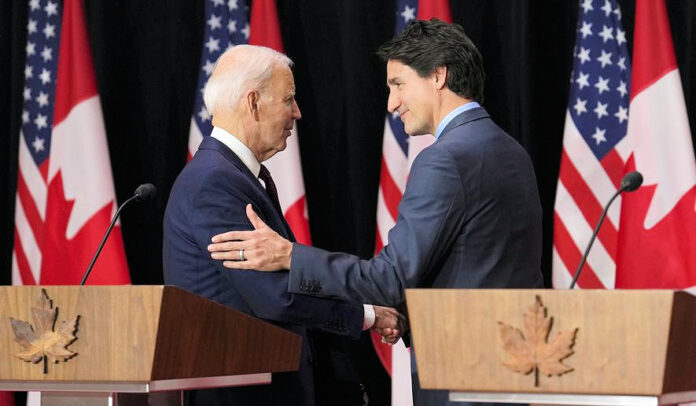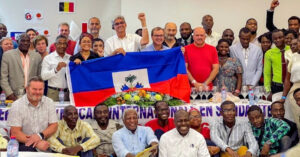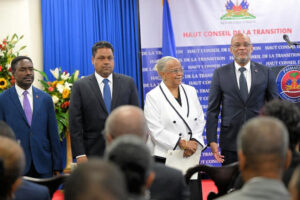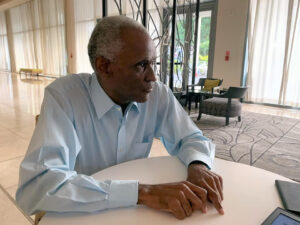
A coalition of trade unions in Haiti recently published the “Ouanaminthe Declaration” after a two-day gathering by the Confederation of Haitian Workers (La Confédération des travailleurs haïtiens – CTH) and the Confederation of Public and Private Sector Workers (la Confédération des travailleurs et travailleuses des secteurs public et privé – CTSP).
The gathering was held in Ouanaminthe, Haiti — a Dominican-Haitian border town — on Jan. 25 and 26, 2023.
The declaration was drafted a month after the announcement of de facto PM Ariel Henry’s “December 21 Accord” – the National Consensus for an Inclusive Transition and Transparent Elections. It is a tacit rejection of Henry’s “new” coalition.
The Ouanaminthe Declaration calls for “international solidarity generally, and trade union solidarity in particular.” It also rejects international military intervention, stating that “any international armed intervention would go against Haitians’ right to self-determination.”

The Ouanaminthe Declaration doesn’t offer many details regarding governance. It does state that the signatories are “actively participating with other civil society actors.” Their aim is to “establish a transitional government, based on a broad national consensus of the representative forces of the country, which finally guarantees the conditions for the organization of legitimate, transparent, and democratic elections.”
The two-day meeting was also attended by representatives from trade unions in Belgium, Brazil, Canada, Costa Rica, Spain, France, Italy, Panama, Dominican Republic, and Sweden.
Canadian Union of Public Employees (CUPE) Regional Vice-President for Quebec, Richard Delisle, attended the meeting. Heeding the call for international solidarity between trade unions, Delisle said that “CUPE has written to Foreign Affairs minister Mélanie Joly calling on the Canadian government to respect Haitian democracy and self determination, and to stay away from military intervention.”
More calls for solidarity with Haitians against an intervention appeared soon after the Ouanaminthe Declaration.
It is unclear why Washington continued to support Henry as the leader for the transitional government.
On Feb. 14, 2023, a letter was published on Haiti Watch addressed to the leaders at the CARICOM biannual meeting. The leaders welcomed Prime Minister Ariel Henry to their biannual meeting. Canada’s Prime Minister Justin Trudeau was also invited. While Caribbean leaders refused to endorse a military intervention in Haiti, several leaders endorsed the framework of “supporting the Haitian National Police,” although no national leader has yet offered to lead such a mission.
The letter was signed by representatives from dozens of Haitian civil society and solidarity groups.
The letter calls out the “undeclared war which the imperialistic powers are waging against the Haitian people.” Explaining that this war “is entering its final stage of implosion, whereby the fundamental rights to security, freedom of movement, food, education, health and life itself are all being systematically denied to the Haitian people.” The letter refers to Ariel Henry as “the CORE group’s Prime Minister” and a “traitor.” The signatories accuse him of “high treason” for “requesting foreign military intervention on our national soil.”
The letter pleads with CARICOM, saying “ it is time for the Caribbean to stop being the amplifiers of the former colonial powers, who are today’s imperialistic powers, and instead rediscover the meaning of active solidarity.” The letter ends with a global call for solidarity with the Haitian people.
The Canadian Foreign Policy Institute published a statement of solidarity with Haitians a few days later. In the statement, the Institute’s director, Bianca Mugyenyi, points out that “Haitians have been calling for the U.S. and Canada to respect their sovereignty.” Mugyenyi argues that “if Justin Trudeau wants to help Haitians, he should withdraw Canada from the Core Group and stop propping up Ariel Henry who has contributed to the country’s crisis.”
Two days later, another call for solidarity with the Haitian people came from the Caribbean Organization for Peoples Empowerment. Their letter to CARICOM leaders argues that the calls for intervention have “nothing to do with protecting Haitian people from gang activity and everything to do with reinforcing the control of Haiti by the self-appointed CORE Group.” They claim that the goal of this intervention is to “shore up” the “CORE group imposed government of Ariel Henry’s Parti Haïtien Tèt Kale (PHTK) and suppress the struggle of the Haitian people against it.”
The letter demands that CARICOM leaders call for “the disbanding of the CORE Group and ending the interference of this group’s members in Haiti’s affairs.” The letter also demands CARICOM leaders demand Henry step down and “facilitate an all-inclusive dialogue between all sections of Haitian society.”
Competing Political Parties and Coalitions in Haiti’s Political Class
These declarations and statements all point towards the central problem of U.S. and CORE group policies towards governance in Haiti – their unrelenting support for de facto PM Ariel Henry.
A few months ago, it seemed like Washington was favoring the Montana Accord leadership as the next Washington-approved interim leaders of Haiti. Think-tanks, diplomats, journalists, and activists were promoting the Montana Accord as the best choice for leading a broad-based, “Haitian-led” interim government. Montana is Henry’s main rival in Haiti.

It is unclear why Washington continued to support Henry as the leader for the transitional government. He is deeply unpopular in and outside Haiti. He also remains a prime suspect in the assassination of his predecessor, Jovenel Moise.
When Henry announced his “December 21 Accord,” Washington could have used that opportunity to shift support to the Montana Accord . Instead, it used this announcement as an opportunity to publicly renew their support for him.
Regional organizations like CELAC, the Organization of American States (OAS), and CARICOM also made clear they recognize Henry as leader. Recently, CELAC and CARICOM even “welcomed” Henry’s Dec. 21 Accord while the OAS called it an “important step forward.”
Henry also announced a new “High Transitional Council” (HTC), whose three members – Mirlande Manigat, Laurent Saint Cyr and Calixte Fleuridor – he appointed. They are tasked with organizing elections in a year’s time. He also recently appointed eight Supreme Court Justices by decree, in direct violation of the Haitian Constitution, cementing his role as a U.S. and CORE group-backed dictator.
On Jan. 30, a new declaration was published. Signed by eight political parties – Pitit Desalin, UNIR, Kontrapèpla , OPL, MOPOD, LAPEH, GREH, and the PHTK – the declaration calls for continued mobilization and renews demands for Henry to step down.
A week before this joint-declaration was announced, PHTK president Line Balthazar stated on Magik9 that the PHTK thinks Ariel Henry’s bad policies have made Haiti ungovernable and is leading the country “straight towards disaster.” He argues that Henry’ “bad governance” has “put state institutions in danger.”
The PHTK previously had a vote on the Montana Accord’s National Transitional Council (CNT). As did UNIR, Pitit Desalin, MOPOD, and the OPL. This no longer seems to be the case.
The Montana Accord began losing support when the CNT began nominating two interim leaders – a transitional President and Prime Minister – back in 2021.
OPL general coordinator Edgar LeBlanc Fils, a signatory to the declaration, was a front-runner for the position of interim President, but the CNT elected economist and former Haitian central bank governor Fritz Alphonse Jean to the post.
Several Haitian trade unions – some of them signatories to the Ouanaminthe Declaration – previously backed the Montana Accord when it was first signed in August 2021. Since then, some withdrew support. The declaration does not mention the Montana Accord but does call for a “transition de rupture”(transition through rupture), a phrase sometimes used by Montana’s signatories and proponents. The Ouanaminthe Declaration also mentions the need to build a “broad-based coalition” before moving onto elections, possibly signaling that the signatories don’t support Montana’s direction and leadership but do recognize the principle of a broad-based coalition on which it was predicated.
Commenting on withdrawing support from the Montana Accord, MOLEGHAF’s leader, Oxygène David, said Montana’s leadership “never believed in mass mobilization,” favoring bureaucracy instead. According to Oxygène, Montana’s claim to want a Haitian-led solution “was a lie which they fed to the nation so that they could cohabitate with their bosses, the U.S. imperialists.”

Fanmi Lavalas (FL) departed the Montana coalition after withdrawing support for the CNT, accusing the CNT leadership of factionalism. Since then, Lavalas’ role in coalition-building seems to be nonexistent. The party continues to publish statements that are vague and offer no concrete proposals.
Their Feb. 28 statement, translated into English and posted on the Haiti Info Project’s Twitter page, states that “the problem of insecurity that worries Haitians” could be the “starting point for a dialogue that would make it possible to reach a broad and solid consensus for immediate actions, and guidance for the long term.”
FL representatives met with Jamaican President Andrew Holness, who led a one-day delegation to Haiti to meet with leaders from various political parties and civil society organizations on Feb. 27. This followed the biannual CARICOM leaders meeting. FL spokesperson Jodson Durogène declared it had “drawn the attention of CARICOM to the fact that the strengthening of the National Police of Haiti (PNH) should first be a Haitian initiative.”
FL is now in agreement with Ariel Henry and the Montana Accord leadership that international support for the PNH is required. They just do not, however, agree on who ought to be in leadership when the “support” arrives.
The risk in allowing Washington and the CORE group to have any role in supporting the PNH was made clear when former U.S. Ambassador to Haiti Pamela White, in the Dec.2 Washington Post, explained her plan for the Biden administration to send “2,000 armed law enforcers” to Haiti. To avoid the optics of thousands of armed U.S. soldiers landing in Haiti, White proposed that Washington “send in a couple of hundred at a time, over six months, with little fanfare.”
“Support for the PNH” could easily evolve into a “special military intervention” by another name.
The Looming Threat of the Global Fragility Act
In a recent statement , OPL leader Leblanc warned that Haiti’s slide into authoritarianism has put the country at risk for partnership with the U.S. government under the Global Fragility Act (GFA).
Proponents of the GFA describe it as “an opportunity for the United States to posture itself to reduce violence and fragility in a manner that positions America to secure short-term interests.” Haiti was named the first “partner” under the GFA, which was signed into law under the Trump administration and has full bipartisan support, including Congresswoman Ilhan Omar.
The GFA allows for the U.S. government to negotiate bilateral, 10-year-long “planned security assistance” deals with so-called “fragile states.” Fundamentally, the GFA fundamentally represents a repackaging of interventionist policies that will maintain U.S. hegemony over Haiti.
Canada also supports the GFA
Nou Pap Domi (NPD) is a foundational member-organization of the coalition that created the Montana Accord. One of its members and spokespersons, Emmanuela Douyon, recently offered support for the GFA at a Dec. 15 Alliance for Peacebuilding conference , along with Kalinda Magloire. Magloire is a “technical director for peace and stability” at Management Systems International (MSI), which implements USAID projects worldwide.
Douyon, previously worked for the National Democratic Institute (NDI), an arm of the National Endowment for Democracy (NED), which in turn is funded by the U.S. State Department and USAID. Later, she received an NED grant to found Policité , a “think tank” that conducts surveys and offers consultation services.

Another guest speaker at the conference, analyst Jeffsky Poincy, said (rather prematurely) that he was “glad Haiti is part of the GFA.” Poincy is a program manager at Partners Global, a consultancy firm funded by the U.S. State Department, the Canadian government, the Open Society Foundation, and USAID.
As a general rule, people and organizations receiving funds from the U.S. government do not challenge the framework of U.S. foreign policy. Washington’s continued policy is to maintain Haiti’s neo-colony status. The GFA is one tool for doing that. Douyon’s comments can be interpreted as further compliance for U.S. imperialist domination of Haiti.
In contrast, Montana spokesperson Jacques Ted Saint Dic recently claimed to oppose “international power.” During a recent interview on Magik 9, Saint Dic did a complete reversal on his earlier claims that the U.S. has a “powerful and important role” to play “in helping get democracy back on track in Haiti.” In the interview, he said Montana is “an opposition force to international power,” saying “the Americans hold the real power in Haiti” and that “Montana intends to seize power through negotiation, through social and citizen mobilization,” bravado which is belied by the evident shrinkage of and splits in Montana’s coalition.
Coalitions, Declarations, a Fractured Political Class, and Haitian Sovereignty
The proto-coalition of eight parties which signed Moïse Jean-Charles’ Jan. 30 declaration claim to be focused on gaining popular support and mobilizing citizens to prevent Henry from consolidating power and possibly negotiating “security assistance” under the GFA. They also claim to want to build a broad-based coalition.
In an interview posted Feb. 10 to Twitter, OPL’s Leblanc makes it clear that he rejects an intervention by a special military force. He explains that their view is that gangs are a consequence of the conditions generated by Ariel Henry and oligarchs who back the gangs. These conditions, Leblanc argues, have made an election a year from now – as the Dec. 21 Accord promises – technically impossible.
The political class remains fractured. A clear plan on how to address gang violence that doesn’t involve armed conflict in Haiti’s poor neighborhoods is elusive. Calls for amnesty, collaboration with neighborhood committees and vigilance brigades – any strategy for improving the security crisis and reducing gang violence – remains outside of public discourse.
The political class has presented no plan on how to actually remove Henry from power. No coalition yet seems prepared to challenge U.S. hegemony in Haiti, and Haiti will not break free from its current status of U.S. neo-colony unless Ariel Henry is expelled from power and a transitional government that represents the Haitian people takes power.
Leblanc’s public rejection of the GFA and its 10-year “security assistance” deal – occupation by another name – is a positive step. Encouraging public discourse on the GFA’s nature is also important.
As Kalinda Magloire explained during Alliance for Peacebuilding conference, the GFA still needs a “credible interlocutor,” a national leader, coalition, or organization who can successfully convince Haitians that the GFA is a good policy for Haiti. So far, U.S.-funded organizations like OCAPH, Kafou Lespwa, and Initiative de la Société Civile have been unable to generate enough attention to manufacture consent for the GFA in Haiti. But Washington’s efforts to groom sectors of Haiti’s political class, inside Haiti and in the diaspora, are ongoing.

Leblanc’s warning that Henry could negotiate a bilateral agreement with the United States under the GFA on his own is ominous. (Only an elected government is supposed to sign a GFA deal.) Henry has already requested an intervention to address “gang violence” and shore up his deeply unpopular regime. He does enjoy diplomatic support from Washington, the CORE group, and many other leaders and regional groups.
For example, CARICOM on Mar. 6 stated that they have agreed to “work with the Governments of Canada and the United States as well as the UNDP [the United Nations Development Plan] on the ongoing issues” in Haiti. In addition, they promised to “approach” the International Monetary Fund and the World Bank “to ascertain what further assistance they could provide to Haiti.” CARICOM seems willing to assist in keeping Haiti trapped under Washington’s hegemonic control.
International Solidarity with Haiti
Solidarity activists outside of Haiti who are determined to assist Haitians break free from U.S. hegemony should heed the calls of the trade unions behind the Ouanaminthe Declaration. They also ought to continue calling for their leaders to withdraw support for Ariel Henry and look for opportunities to get the attention of leaders from regional and economic bodies like the BRICS, the African Union, and the Belt and Road Forum for International Cooperation. Growing relations with representatives of the nations which are members of these regional and economic organizations opposing U.S. imperialism is a possible strategy for helping Haiti’s liberation.
It is understood that the flood of weapons gangs use to terrorize Haitians are coming through privately owned ports in Haiti. Port Lafito, Haiti’s largest port, is privately owned by billionaire oligarch Gilbert Bigio. Bigio is the target of Canadian sanctions and accused of supporting and arming gangs.
the U.S. and Canada’s efforts to recruit a CARICOM nation to lead a mission into Haiti to “support the PNH” seems to have foundered.
It is wishful thinking to believe that Washington will take serious action against the weapons smuggling that they have deliberately allowed to flourish in the region. Only large, regional, and international bodies can enforce an embargo and cut-off the flood of weapons into Haiti.
The series of sanctions slapped on Haitian politicians and oligarchs by the UN, Canada, and the U.S. have also failed to dislodge Henry or address gang violence. Henry, in fact, welcomes these sanctions, telling VOA news in an interview that they are “helpful.”
The Black Alliance for Peace (BAP) and Haiti Liberté accomplished two of the most effective acts of international solidarity in recent memory. They effectively helped to block U.S. efforts to occupy Haiti, under the guise of a “special military force,” at the UN.
BAP delivered an open letter to the Representatives of the People’s Republic of China and the Russian Federation in October titled “No to Foreign Military Intervention In Haiti! Yes, to Haitian Self-Determination!” Delivering a similar message, Haiti Liberté’s editor Berthony Dupont wrote an open letter to ALBA’s Secretary General.
On Dec. 21, Haiti Liberté journalist Kim Ives delivered a 15-minute anti-intervention presentation to the UN Security Council, prompting Russia’s Permanent Representative to the UN, Vassily Nebenzia, to say that the “historical responsibility” for the current situation in Haiti “rests not only with Washington, which has repeatedly interfered in Haiti’s internal affairs, including by armed force, but also with Paris.”
These former colonial powers, Nebenzia explained, “have changed their methods, but their colonial approaches have remained the same. Interference in Haiti’s internal affairs occurs by means of imposing foreign solutions and putting in place political figures outside of Haiti’s legal mechanisms. Lasting international involvement in Haitian affairs have instilled in some local elites the feeling of dependency and permissiveness and made them think that their future would be contingent, not on a popular vote, but on the benevolence of external patrons and sponsors.”
This unusual and welcome development at the Security Council is a direct consequence of the efforts of BAP and Haïti Liberté. For the moment, the UN is no longer a vector for Haiti’s imperialist domination.
Meanwhile, the U.S. and Canada’s efforts to recruit a CARICOM nation to lead a mission into Haiti to “support the PNH” seems to have foundered. Even Biden’s Mar. 23-24 visit to Canada to press Justin Trudeau to do U.S. bidding more forcefully in Haiti failed. Canada has only made some spy plane overflights, posted two frigates off Haiti’s coast, and sent a few police trainers.
Nonetheless, Washington has proven to be relentless in pursuing Haitian intervention in the past (e.g. 1993 and 1994) and should not be underestimated now. Anti-imperialists everywhere should continue to pressure regional organizations like CELAC and CARICOM , as well as their individual members which oppose U.S. policy in the region, to resist all North American efforts to further subjugate Haiti.
This is a slightly edited and updated version of an article first published by Black Agenda Report on Mar. 15. Travis Ross is a teacher based in Montreal, Québec. He is also the co-editor of the Canada-Haiti Information Project at canada-haiti.ca . Travis has written for Haiti Liberté, Black Agenda Report, TruthOut, and rabble.ca. He can be reached on Twitter.










[…] Global Fragility Act. That law would “prevent and reduce violent conflict” abroad by means of “negotiating bilateral,” 10-year-long “security assistance” arrangements with “fragile […]
[…] Act. That law would “prevent and reduce violent conflict” abroad by means of “negotiating bilateral, 10-year-long “security assistance” arrangements with “fragile […]
[…] Act. That law would “prevent and reduce violent conflict” abroad by means of “negotiating bilateral, 10-year-long “security assistance” arrangements with “fragile […]
[…] coalition that created the Montana Accord. One of its members and spokespersons, Emmanuela Douyon, recently offered support for the GFA at a December 15, 2022, Alliance for Peacebuilding […]